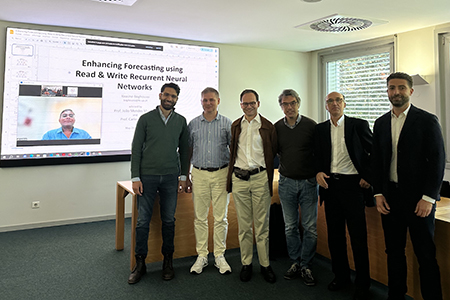Candidate
Yassine Baghoussi
Date, Time and Place
May 29, at 09:30, Sala de Atos FEUP
President of the Jury
Pedro Nuno Ferreira da Rosa da Cruz Diniz, PhD, Full Professor, Department of Informatics Engineering, Faculty of Engineering, University of Porto.
Members
Joydeep Chandra, Phd, Associate Professor, Department of Computer Science and Engineering, Indian Institute of Technology, Patna, Índia;
Mykola Pechenizkiy, PhD, Full Professor, Department of Mathematics and Computer Science, Eindhoven University of Technology, The Netherlands;
Luís Filipe Pinto de Almeida Teixeira, PhD, Associate Professor, Department of Informatics Engineering, Faculty of Engineering, University of Porto;
João Pedro Carvalho Leal Mendes Moreira, PhD, Associate Professor, Department of Informatics Engineering, University of Porto (Supervisor).
The thesis was co-supervised by Professor Carlos Manuel Milheiro de Oliveira Pinto Soares, Associate Professor at the Department of Informatics Engineering, University of Porto.
Abstract
“Machine Learning (ML) relies on both data and algorithms for optimal functioning. While conventional ML research often emphasizes algorithmic improvements, the significance of data processing is frequently overlooked. In contrast, preprocessing data stands as a distinct task, executed before feeding it into algorithms. The diversity of preprocessing methods tailored for various ML algorithms underscores its importance. However, the feedback loop between algorithms and data is often neglected. Data-related issues pose significant challenges for predictive ML algorithms, adversely affecting forecasting accuracy. These challenges arise because problems in data are inherently unpredictable, lacking a discernible pattern. In this doctoral thesis, we introduce Read and Write Machine Learning (RW-ML), an innovative paradigm enhancing time series forecasting accuracy by integrating data modification techniques into the learning process. The RW-LSTM, an adaptation of the backpropagation algorithm, unifies preprocessing with recurrent neural networks (RNNs), significantly outperforming traditional models such as LSTM. RW-LSTM enables the transition from read-only RNNs, which merely learn from data, to RW-ML, allowing direct alterations for improved predictions. Expanding the framework, the Corrector Long Short-Term Memory (cLSTM) addresses the limitations of read-only RNNs, demonstrating enhanced forecasting accuracy through empirical verification and extensive experiments. The final chapter provides a real-world evaluation, highlighting the competitive advantage of cLSTM over LSTM models in various scenarios.”
This research was carried out as part of SonaeIM.Lab@FEUP, involving Inovretail.
